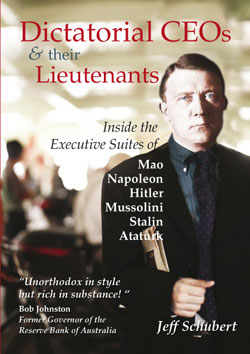Putin, Gillard, Medvedev, Abbott · 19 November 2012
My internet site www.russianeconomicreform.ru has an implied theme that Russian economic policy makers could learn much from the approach of Australia over the last few decades.
While historical factors and in-place institutional arrangements place substantial limits on what leaders as ultimate economic policy makers can influence and control, their own personal psychological make-ups will influence their chosen policies and implementation.
This article briefly summarizes the personalities (psychological make-ups) of the two most important political figures in Australia and Russia, and the implications of these for the most crucial economic issues facing these two countries. In the case of Australia, I take the most crucial issue to be dealing with the rising economic and political power of Asia (in particular non-NE Asia). In the case of Russia, I take this to be dealing with internal economic reform and the wishes of the middle classes for political power.
In essence, my view is that at an intellectual and psychological level Russia presently has superior leaders to Australia. (I have written a number of articles (blogs) on each of the individuals, which can be accessed on this site)
Intellectually and in terms of a balanced personality, Dimitry Medvedev (despite his short physical stature) stands head and shoulders above Vladimir Putin, Julia Gillard and Tony Abbott. He does not appear to have any personal basic pathological (read abnormal or diseased psychology) issues. He is very open to new ideas and experiences even if this enthusiasm includes a touch of naivety, and he has displayed excessive loyalty to Putin.
Vladimir Putin also does not have significant basic pathological issues—- his main problem is that too much time in power has begun to warp his thinking, and he now regards himself as much more indispensable than he really is. However, his basic psychological make-up (judging by his career and the way he has conducted himself while in public office) seems to have been defensive rather than a need to project himself to high office or deeds of greatness in order to prove that he is a worthy person. While intelligent, Putin is not as intelligent as Medvedev.
Gillard has a great need for personal achievement there is a pathological issue at play. Gillard lacks any sort of talent for originality or vision. For her, achievement is signified by power; only in this way can she prove to herself and others that she is a worthy person. Intellectually, she is several notches below Putin. However, like him, she is very self-disciplined in fact, even more so!
Abbott is intellectually superior to Gillard, but he lacks her enormous self-discipline when it comes to focus on issues. However, Abbott is no match for Medvedev in either intellectual terms or openness to ideas and new directions. He seems constrained by a personal system of beliefs (feelings) which will all too easily override rationality. Intellectually, he may in theory be the equal of Putin but Putin would always win a contest of the mind because of his self-discipline.
Overall, intellectual and in terms of psychological balance, Medvedev comes out on top while Gillard occupies the lowest level. In terms of overall capability, Russia presently has superior leaders to Australia.
Comparing Russia and Australia in these terms, one might be tempted to conclude that a semi-authoritarian political system is better for Russia than the likes of Gillard and Abbott. However, in Australian history the low-standard Abbott/Gillard act is probably a depressing aberration.
In terms of the implications for crucial economic policy issues the rising economic and political power of Asia for Australia and internal economic and political reform for Russian the signs are not particularly good.
Putin, Gillard and Abbott fear change.
While Putin has a need for control, his main fears basically derive for the chaos of the Yeltsin years. His view of internal Russian affairs suffers from this. However, he has a reasonably sophisticated world view.
Gillard’s fears have a more personal psychological aspect as do Abbott’s. Both are astonishingly ignorant people once they step outside the familiar areas of domestic politics and the Anglo-sphere. An example is the simplistic way in which they both talk about learning foreign languages (neither Putin nor Medvedev, who have put in the effort to learn a language or two, would be so clueless).
Neither Gillard nor Abbott has the desirable combination of intelligence, curiosity or emotional flexibility to handle the rise of Asia to the best advantage of Australia.
Putin has also become a negative factor for Russia. He understands the details of many issues, but his inflexibility and need for control will grow over time — and, even worse, will be accompanied by a decreased capacity/desire to work hard on details.
Medvedev is the most willing of all to consider and embrace change. With its better institutional environment, Australia would probably perform wonders if he was one on its leaders.


